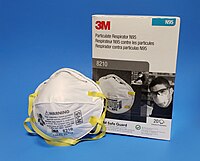
Photo from wikipedia
Inexpensive cloth masks are widely used to reduce particulate exposures, but their use became ubiquitous after the outbreak of COVID-19. A custom experimental setup (semiactive at 5.1 m/s airflow rate) was… Click to show full abstract
Inexpensive cloth masks are widely used to reduce particulate exposures, but their use became ubiquitous after the outbreak of COVID-19. A custom experimental setup (semiactive at 5.1 m/s airflow rate) was fabricated to examine the efficiency of different types of commercial facemasks collected randomly from street vendors. The sample (N = 27) including (n = 16) cloth masks (CMs), (n = 7) surgical masks (SMs), and (n = 4) N95 filtering facepiece respirators (FFRs), of which SMs and N95 FFRs taken as a standard for efficiency comparison were all tested against ambient aerosols (PM2.5 and PM10 μg/m3). The prototype cloth masks (PTCMs) (N = 5) design was tailored, and their performance was assessed and compared with that of standard commercial masks. The filtering efficiency tested against ambient coarse particulates (PM10) ranged from (5% to 34%) for CMs with an average of 16%, (37% to 46%) for SMs with an average of 42%, (59% to 72%) for PTCMs with an average of 65%, and (70% to 75%) for N95 FFRs with an average of 71%, whereas against fine particulates (PM2.5), efficacy ranged from (4% to 29%) for CMs with an average of 13%, (34% to 44%) for SMs with an average of 39%, (53% to 68%) for PTCMs with an average of 60%, and (68% to 73%) for N95 FFRs with an average of 70%, respectively. The efficiency followed the order N95 FFRs > PTCMs > SMs > CMs showing poor exposure reduction potential in CMs and high exposure reduction potential in N95 FFRs and PTCMs. Amendment in existing CMs using eco-friendly cotton fabric with better facial adherence can protect human health from exposure to fine particulates <2.5 μm and can reduce the risk of micro-plastic pollution caused by polypropylene (PP) facemasks.
Journal Title: Journal of Environmental and Public Health
Year Published: 2023
Link to full text (if available)
Share on Social Media: Sign Up to like & get
recommendations!